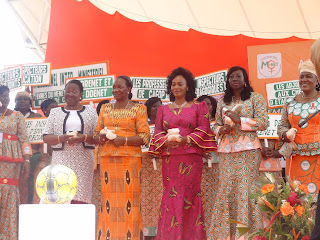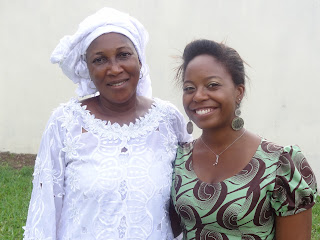Disclaimer: I am going to make a lot of generalizations in this particular blog, but I want to paint a picture of what I can see are the visual, cultural, climatic, etc. differences between Accra and Dakar. Hopefully, no one takes offense to anything I may comment on.
Climate: At the current moment, it is very chilly in Senegal (I’d say 70s, which is cold if you ask me). I have had to wear long pants and long sleeves to bed every night. I think that this is because of the dry season, but it is a lot colder here than it ever was in Ghana. It feels more beachy here than it did in Ghana. We are like right on the ocean, too. Because of this, there is sand all over the sidewalk and it feels much dryer (i.e. I have to put lotion on my ashy legs everyday) than the humid Accra.
Education systems: We visited the Université de Cheik Anta Diop (the largest one in Senegal) last week. Apparently, the school is hardly in session due to strikes by students or professors. Sometimes there will be whole years (termed “année Blanc”) where the students never go to class because of the strikes. Also, the students have to pay tuition to the university, but often they get scholarships based on their performance on the extremely difficult baccalaureate tests in high school. The test is hard because there is only so much scholarship money and/or room at the university for the students. This is quite different from the university system I encountered in Ghana. There are three large university campuses (and a host of smaller, training institutions) – University of Cape Coast, University of Ghana, and Kumasi University of science and technology. There is no tuition; instead students pay fees and have to essentially pay back the government through the national service required to be completed after the student graduates.
Dakar vs. Accra: Dakar is much cleaner than Accra. I can see why it has been called “the Paris of West Africa.” It seems like Dakar was a planned city; laid out a certain way to avoid urban sprawl and with all the government offices located together. It also has green spaces, gorgeous statues, lovely town squares (like La Place du indépendance). This is much different from Accra – open sewers, trash everywhere, no rhyme or reason to lay out, sidewalks covered in people selling their products, etc.
Political system: Comparatively, Senegal has been more stable politically than Ghana. There have only been three presidents, no coups, and for the most part, those three were democratically elected. The presidential elections are coming up in February, but they should be pretty secure and stable, excluding protests and rallies. Still, Senegal is a poor nation that sees thousands upon thousands of its young male workers illegally immigrating to Italy, Spain, France. It also still is dealing with the political strife in the Casamance region.
Transportation: There are more options in Dakar when it comes to transportation. Your choices are: a DDD (the equivalent to the metro buses in Accra; government run, large buses with a fixed rate. Sometimes you will get a seat but most of the time you are standing in the aisle), a Ndiaga Ndiaye (pronounced Jaga Jie) which is most similar to a tro-tro (a large white van with seats rigged in the aisles, a driver and a mate.). One difference is that there are no side doors on the Ndiaga Ndiaye, only front or back doors. The mates often hang out the back. The other mode of transportation is the car rapide. These are highly decorated vans (painted yellow, red, and green, with Wolof and Arabic phrases all over them, and with ribbons of various colors hanging from the back, sides and mirrors). In many ways similar to the ndiaga ndiaye, these car rapides don’t have glass in the windows, they have benches instead of seats, and every time I have seen one, there is at least two people hanging out the back door. In a tro-tro, one would never stand up. In a ndiaga ndiaye and a car rapide, standing is the norm. Also, in a tro-tro, one is guaranteed their own seat. In a ndiaga ndiaye or car rapide, someone else’s butt may be in your lap. There is also the taxi, but these are the same as taxis in Accra.
Every day life: Hawking is less prevalent in Dakar than Accra, but it is still there. Tigo, a phone company in Accra, is also used in Dakar.
In Senegal there is something very intriguing called a “joking cousin” (suma kal). These are people who essentially make fun of others, all the time. For example, if your last name is Ndiaye (which is my last name here) than your joking cousin is the Diop. When you meet a Diop it is expected that you make fun of them in some way. It isn’t serious; it’s just sarcasm and petty jokes (comme ca: "Diops eat too much, they are lazy, etc.) However, if you don’t make jokes, that is considered offensive. There are also joking cousins among ethnic groups i.e. the Peulhs versus the Wolofs. The government used this popular cultural practice when they were attempting the peace process in the Casamance, using the joking cousin of the Jola people to encourage resolution.
Many people speak English, which was a bit surprising, but if you think about it, not really. Many students learn some English in school in hopes of migrating to the U.S., teens listen to American songs and to cater to tourists, vendors know the basics (“please, miss, come look at my items. How are you? I am fine.”) The U.S. embassy is much more heavily guarded here than in Accra; tons of barriers and a ton of gendarmes (police) patrolling the area.
Stuff is a heck of a lot more expensive here than it was in Accra. (500 cfa = about 1 dollar). Juice, for example, costs more than a dollar for a tiny bottle. Fruit is a lot more expensive as well (orange in ghana = less than a nickle, in Senegal = 20 cents), but we get a stipend so it’s okay.
Interesting info: Wrestling (la lutte) is more popular here than soccer. The sport is very traditional, with sumo wrestling-esque diapers and a huge circle. Two lutteurs battle it out as such: first they slap each other, girl fight/cat fight style. then someone throws a punch, and it's on. There is a lot of grabbing,kicking, punching,and then finally the winner is able to throw the loser down on the ground. I watched a battle yesterday with my host family and they were really into it, yelling, taunting the opponents, excited.




















